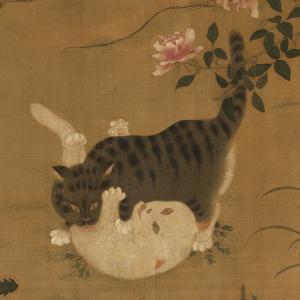To the tune "Southland Song"—"Phoenix-like bun and gold-pleated ribbon | 南歌子 · 鳳髻金泥帶

Detail from 宋徽宗真蹟耄耋圖(Two Cats) 卷, 趙佶, National Palace Museum, Accession Number: K2A001419N000000000PAF [Public Domain]

Detail from 宋徽宗真蹟耄耋圖(Two Cats) 卷, 趙佶, National Palace Museum, Accession Number: K2A001419N000000000PAF [Public Domain]